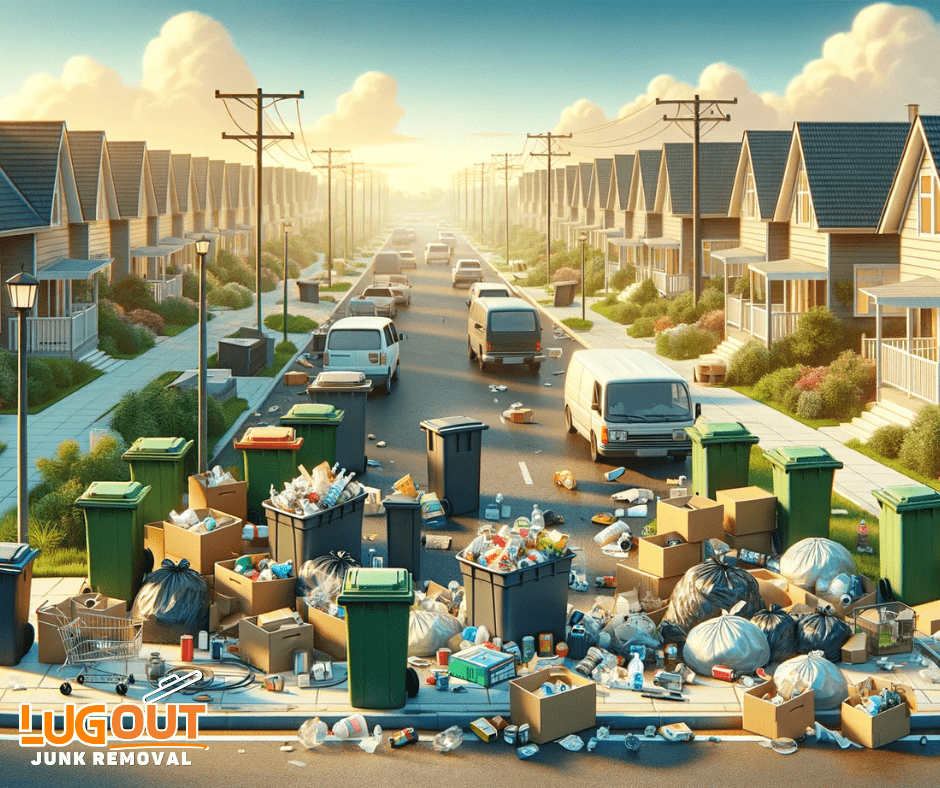
Table of Contents
- Understanding the Importance of Proper Disposal
- Common Mistakes in Waste Segregation
- The Impact of Incorrect Electronic Waste Disposal
- Consequences of Overflowing Trash Bins
- Tips for Efficient and Sustainable Waste Management
- About the Author: Todd’s Commitment to Smart Disposal
Understanding the Importance of Proper Disposal
Waste disposal is not just a routine chore; it’s a crucial aspect of maintaining a healthy, sustainable, and aesthetically pleasing environment. Every year, residential areas generate a significant amount of waste, much of which is improperly disposed of, leading to environmental and health hazards. Understanding the importance of proper waste disposal is the first step towards a cleaner and safer community.
The Environmental Impact
Improper waste disposal has dire consequences on the environment. When waste is not segregated or disposed of correctly, it can lead to soil contamination, water pollution, and harm to wildlife. For instance, non-biodegradable materials can linger in the environment for years, posing a threat to ecosystems and biodiversity. Furthermore, incorrect disposal of hazardous materials can leach toxins into the soil and groundwater, affecting plant, animal, and human life.
Health Concerns
The health implications of improper waste management are profound. Residential areas with poor waste disposal practices are breeding grounds for bacteria, viruses, and pests. These can lead to a range of diseases, from respiratory infections to more severe health conditions. Moreover, the burning of waste in open areas releases harmful toxins into the air, exacerbating respiratory issues and contributing to air pollution.
Aesthetic and Social Implications
A neighborhood cluttered with improperly disposed waste is not only unsightly but also diminishes the quality of life for its residents. It can lead to a decrease in property values and affect the overall image of the community. In contrast, areas that prioritize proper waste disposal are more attractive, promoting a sense of pride and community among residents.
Economic Benefits
Effective waste management can also have economic benefits. By reducing the amount of waste sent to landfills, communities can save on disposal costs. Recycling and composting, for example, not only reduce the environmental impact but can also generate revenue and create job opportunities.
In conclusion, understanding and implementing proper waste disposal techniques is essential for the health and well-being of our communities. It’s a responsibility that falls on each individual, as our collective actions have a significant impact on the world we live in.
Common Mistakes in Waste Segregation
Waste segregation is a critical component of effective waste management. However, it’s often overlooked or incorrectly executed in residential areas. Understanding and addressing these common mistakes can significantly improve waste management practices.
Mixing Recyclables with Non-Recyclables
One of the most prevalent mistakes is mixing recyclable materials with non-recyclables. This not only contaminates the recyclable items, making them unusable, but also increases the volume of waste that ends up in landfills. Residents should be aware of what items can be recycled in their community and make an effort to separate them accordingly.
Disposing of Hazardous Materials Incorrectly
Hazardous waste, such as batteries, electronics, and chemicals, requires special handling. Many people unknowingly dispose of these items with their regular trash, which can lead to dangerous chemical reactions and environmental contamination. It’s crucial to utilize designated disposal services for hazardous materials.
Ignoring Composting Opportunities
Organic waste, like food scraps and yard debris, constitutes a significant portion of residential waste. Composting is an effective way to manage this type of waste, yet it’s often neglected. Composting not only reduces the amount of waste in landfills but also produces valuable soil amendments for gardening.
Overlooking the Impact of Small Items
Small items, like bottle caps and plastic wrappers, are frequently thrown into the trash without a second thought. However, these items can accumulate and contribute substantially to environmental pollution. Paying attention to the disposal of these small items can make a big difference.
Lack of Awareness and Education
A fundamental issue is the lack of awareness and education about waste segregation. Many residents are unaware of the correct practices or the implications of their actions. Community education and awareness campaigns can play a significant role in improving waste segregation practices.
By addressing these common mistakes, residents can contribute to more efficient and environmentally friendly waste management systems. It’s a collective effort that requires awareness, education, and a commitment to change.
The Impact of Incorrect Electronic Waste Disposal
Electronic waste, or e-waste, is one of the fastest-growing waste streams globally, and its improper disposal poses significant challenges. The impact of incorrect e-waste disposal in residential areas is multifaceted, affecting the environment, human health, and resource conservation.
Environmental Hazards
E-waste contains a variety of harmful substances, including lead, mercury, cadmium, and brominated flame retardants. When disposed of in landfills, these toxins can leach into the soil and groundwater, leading to environmental degradation. Moreover, the informal processing of e-waste, often involving burning or chemical treatment, releases toxic substances into the air, contributing to air pollution and climate change.
Health Risks
The improper handling and disposal of e-waste can have dire health consequences. Direct exposure to the toxic materials in e-waste can lead to a range of health issues, including respiratory problems, skin disorders, and neurological damage. Workers in informal e-waste recycling facilities, often lacking adequate protective measures, are particularly at risk.
Resource Wastage
E-waste contains valuable materials like gold, silver, copper, and rare earth metals. Incorrect disposal means these resources are lost, increasing the demand for new materials and contributing to the depletion of natural resources. Proper recycling of e-waste not only conserves these materials but also reduces the environmental impact of mining and processing new resources.
Solutions and Best Practices
To mitigate the impact of e-waste, proper disposal and recycling practices are essential. This includes using designated e-waste collection centers and recycling programs. Additionally, consumers can contribute by opting for products with longer life spans, repairing instead of replacing electronics, and supporting manufacturers who practice sustainable design.
In conclusion, addressing the issue of e-waste requires a concerted effort from individuals, communities, and policymakers. By adopting responsible disposal and recycling practices, we can significantly reduce the environmental and health impacts of electronic waste.
Consequences of Overflowing Trash Bins
Overflowing trash bins are a common sight in many residential areas, and they present more than just an aesthetic issue. The consequences of this problem are varied, affecting the environment, community health, and the overall quality of life.
Attracting Pests and Vermin
Overflowing bins are a magnet for pests like rats, mice, and insects. These pests not only pose a nuisance but also carry diseases that can be harmful to humans. They can easily become a public health issue if not addressed promptly.
Environmental Pollution
When trash bins overflow, waste can be carried away by wind or rain, leading to litter in streets, parks, and waterways. This not only pollutes the environment but also harms wildlife, as animals can ingest or become entangled in waste materials.
Odor and Visual Pollution
Overflowing bins often result in unpleasant odors, making the surrounding area less desirable for residents and visitors. The visual impact of overflowing waste can also lead to a decrease in property values and affect the overall image of the neighborhood.
Inefficient Waste Management
When bins overflow, it indicates a failure in the waste management system, whether due to inadequate bin size, infrequent collection, or residents’ negligence. This inefficiency can lead to increased costs for waste management and the need for more frequent clean-up efforts.
Solutions and Preventive Measures
To combat the issue of overflowing bins, communities can implement a range of solutions. These include increasing the frequency of waste collection, providing larger or more bins, and educating residents about waste reduction and proper disposal practices. Encouraging recycling and composting can also significantly reduce the volume of waste in bins.
In conclusion, addressing the issue of overflowing trash bins is essential for maintaining a clean, healthy, and attractive community. It requires a combination of effective waste management strategies and community engagement.
Tips for Efficient and Sustainable Waste Management
Efficient and sustainable waste management is crucial for reducing environmental impact and improving the quality of life in residential areas. Here are some practical tips that residents can implement to manage waste more effectively.
Reduce, Reuse, Recycle
The three Rs of waste management — reduce, reuse, recycle — are fundamental. Reducing waste by buying only what is necessary, reusing items wherever possible, and recycling materials correctly can significantly decrease the amount of waste that ends up in landfills.
Proper Segregation
Segregating waste at the source is one of the most effective ways to enhance waste management. It involves separating recyclables, compostable organic waste, and landfill waste. This practice not only makes recycling more efficient but also reduces the amount of waste that needs to be managed.
Use of Composting
Composting organic waste like food scraps and yard trimmings is an excellent way to manage waste sustainably. It reduces the volume of garbage sent to landfills and provides a rich, natural fertilizer for gardens.
Participate in Community Waste Programs
Many communities offer various waste management programs, including recycling, composting, and hazardous waste disposal. Participating in these programs can significantly aid in proper waste management.
Advocating for Better Waste Management Policies
Residents can play a role in advocating for better waste management policies at the local level. This includes supporting initiatives for more frequent waste collection, better recycling facilities, and public education campaigns about waste management.
Leveraging Technology
Technology can aid in efficient waste management. This includes using apps for waste collection schedules, reminders for recycling days, and locating recycling centers or hazardous waste disposal facilities.
In conclusion, efficient and sustainable waste management requires a collective effort from individuals and the community. By adopting these practices, residents can contribute to a healthier, cleaner, and more sustainable environment.
Frequently Asked Questions (FAQ)
Q1: What are the most common items that are incorrectly disposed of in residential areas?
A: Commonly mismanaged items include electronics, batteries, plastics, and hazardous materials like paint and chemicals. These require special disposal methods but are often mistakenly thrown in with regular trash.
Q2: How can I find out about recycling regulations in my area?
A: Local waste management authorities or municipal websites typically provide information on recycling rules and schedules. Some areas also have apps or online tools to help residents understand local recycling regulations.
Q3: Are there any simple steps I can take to reduce household waste?
A: Yes, simple steps include minimizing the use of disposable items, buying in bulk to reduce packaging, composting organic waste, and donating items instead of discarding them.
Q4: What should I do with electronic waste?
A: Electronic waste should be taken to designated e-waste recycling centers or drop-off events. Some electronic retailers also offer take-back programs for old electronics.
Q5: How does improper waste disposal affect the environment?
A: Improper waste disposal can lead to soil and water contamination, air pollution, harm to wildlife, and increased greenhouse gas emissions. It also contributes to the overfilling of landfills.
Q6: Can composting at home really make a difference?
A: Absolutely. Composting at home reduces the amount of organic waste sent to landfills and provides nutrient-rich soil for gardens, reducing the need for chemical fertilizers.
About the Author:
Todd, owner of Lug Out Junk Removal is a seasoned expert in the junk removal industry, has always been driven by a commitment to environmental sustainability and exceptional customer service. With years of experience under his belt, Todd has become a trusted name in the community for smart, efficient, and eco-friendly waste management solutions.
